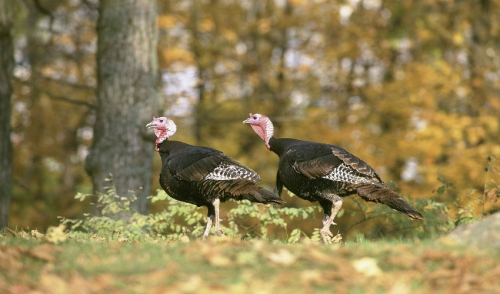{article.name}
Attracting Wild Turkeys

- Share this:
- Share on Facebook
- Pin on Pinterest
- Tweet on Twitter
Wild turkeys are amazing birds and they can be fun to have in the backyard, but only if you're properly prepared for their visits. These birds can be challenging guests, and they're not welcome in every birder's backyard.
Do You Have a Chance to Attract Wild Turkeys?
Wild turkeys won't appear in every backyard just because a birder may want them to visit. These birds are not generally found in large urban areas, in open grasslands or along beaches. Ideally, a birder should live in a somewhat rural area to attract wild turkeys, preferable with plenty of mature forests. If a good stretch of woodland borders the property, it may be even easier to attract turkeys. Fortunately, if a birder lives within the wild turkey's native range, the birds could visit at any time of year – they do not migrate, but will take advantage of any available food source, even foods offered in the backyard.
Should You Try Attracting Turkeys?
These large, social birds aren't always welcome visitors, and birders need to be aware of potential problems before they try attracting wild turkeys. Because turkeys are found in large flocks, they can quickly clean out a feeding area, and they will leave plenty of mess – feces, feathers, etc. – behind. Turkeys can be aggressive and may attack pets or people if they feel threatened, and they can also cause damage to gardens, outdoor furniture, flowerbeds and even vehicles. Getting the opportunity to see them up close can be worth the risk, however, especially if birders are not too meticulous with their yards and are willing to put up with the minor inconveniences of having turkeys around.
Essentials to Attract Wild Turkeys
All wild birds need food, water and shelter, and wild turkeys are no different. If your yard provides everything turkeys need, they are more likely to visit.
- Food: Turkeys will eat on many different foods, especially grain, seeds, nuts, insects, snails, slugs, berries and fruit. Mature oak trees can provide nuts, and a ground feeding area with cracked corn or mixed birdseed is great for turkeys. Berry-bushes, crabapple trees and windfall fruits are other great food sources, and insecticide use should be minimized to provide a hearty protein source for the birds' diet.
- Water: Wild turkeys don't bathe often, but they do need plenty of water to drink. A low, broad bird bath will be a good water source that allows multiple turkeys to visit, and the water should be kept fresh and clean. Even if these birds don't take water baths, however, they will take dust baths, and a wide area of loose, dry dirt can attract them.
- Shelter: All birds need a safe place to roost, and because wild turkeys are so large, they need a sizeable roosting space. They typically roost in mature trees, large brush piles and mature. A large wood pile may also be a good roosting spot if there are open spaces between some logs. In addition to roosting, wild turkeys may also nest in appropriate shelter on the ground, such as in a thicket-like pocket or beneath large, mature shrubs.
Don't Get Any Ideas About Thanksgiving
Some people may want to attract wild turkeys with the idea of bagging one for a Thanksgiving feast. Before planning a hunt, however, check local laws about turkey hunting seasons and what may constitute baiting game animals. In some areas, it may be illegal to attract turkeys for hunting, and it isn't always legal to discharge a firearm in one's backyard. But just having wild turkeys as backyard guests on Thanksgiving can still be a treat!
It takes time and patience to attract wild turkeys. Like all game birds, they can be shy and wary, but once they learn that your yard is turkey-friendly, they will be more likely to visit.
Special Offers
We are constantly adding new specials to our site. Be sure to check back often!


Comments